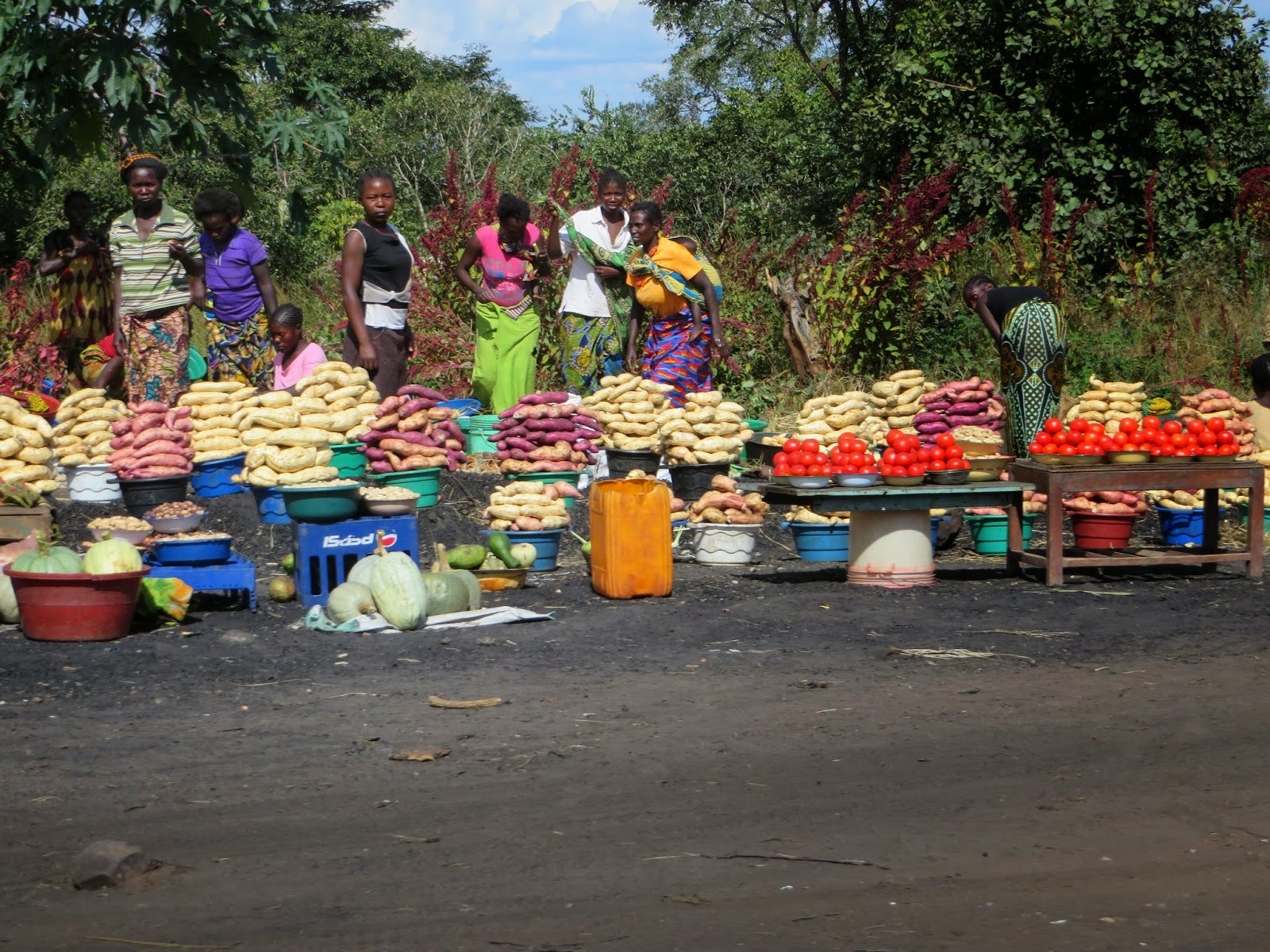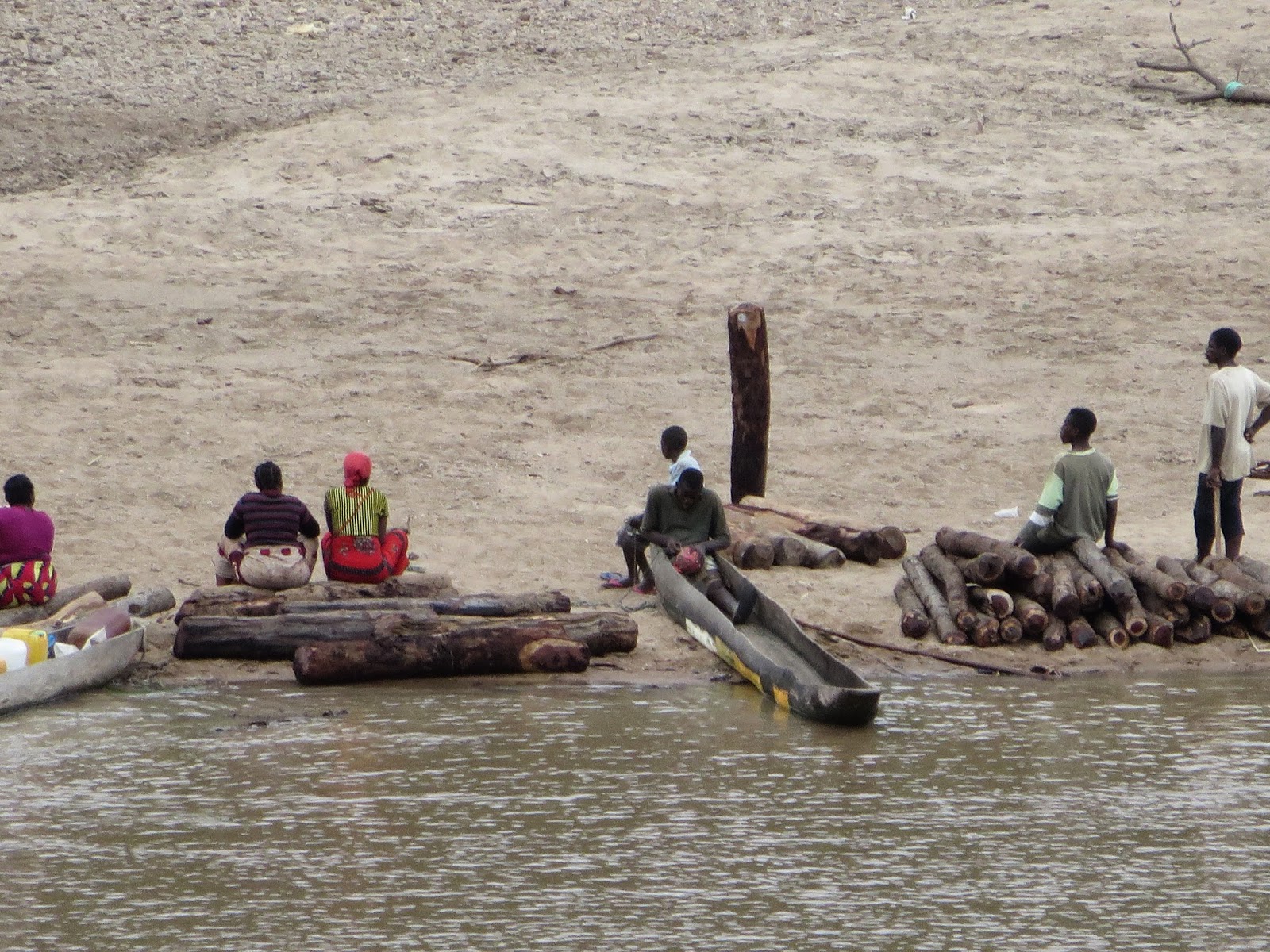After President had his picture taken with me, then he wanted to take one with Elder Bingham and myself.
President Chisimba had a beautiful family and we enjoyed visiting with them very much. He is an airline pilot. Missionaries had met with his wife but he was always working. One Saturday the missionaries caught him at home. He had gone to many different churches but felt that if there was a church that was true, it would be a church that was based in the United States. When the missionaries taught him about the young boy, Joseph Smith, he immediately believed and accepted the gospel. President and Sister Chisimba were baptized in 2007 and the whole family were sealed in the temple in 2008. President and Sister Chisimba are exceptional leaders in the Copperbelt and they have a wonderful family.
President Daka is a branch president. He owns his own taxi business and is working to expand. Sister Daka has a clothing business in town selling second hand clothing. They are wonderful examples of faith and hard work.
The Philip Kapalu family are also examples of faith and hard work. The children of Zambia are beautiful and are such a joy to watch. President Kapalu is also a branch president. He is a branch president, works full-time, and is a student.
 |
| President and Sister Kapato are an inspiration to all who meet them. He has been confined to a wheelchair since he was three years old as a result of polio. We told him he was just like Elder Packer, of the Quorum of the 12, as he also suffers from the effects of polio. They were introduced into the church by a Japanese co-worker. They were both attending different churches but when their co-worker gave him a Book of Mormon to read, Sister Kapato's minister told her to get the book and burn it. She said she couldn't because it was her husband's book and he owned the house and she couldn't burn his book. The minister kept making threats, but Sister Kapato also read the book and gained a testimony of its truthfulness. He is a counselor in the District Presidency and she is also a leader in the church in their branch. They are great examples of faith and service. |
Just a picture of one of the homes in Zambia.
A roadside stand. Nearly anything can be purchased from the open air markets.From the poverty that abounds in the country, this soccer stadium seems a little out of place but soccer is very popular here.
In the countryside it is not uncommon to see yoked oxen, quite often pulling carts loaded with corn, firewood, and people. Most of the cattle and donkeys we saw looked like they needed medication for parasites. Strangely enough, the goats looked good and healthy.
I thought this was unique as we passed this display of gourds for sale along the highway to Ndola.Bicycles are the trucks of Zambia. These men are pushing their heavy loads many miles to market their charcoal.
The women have little wood charcoal cookers they use to cook their food outside. It is a very hard job to make the charcoal but we see the bags of charcoal everywhere. Here they have it stacked at this market. We also see bags standing alongside the roadways to sell, even in remote areas there are bags along the roads for sale.
The women take great pains to stack their potatoes, squash, tomatoes, and whatever they have to sell, in very orderly artful ways.
The people will load up on trucks for transport. Sometimes we see trucks with not even standing room. People will sit on the sides and people fill the inside of the truck bed. We just hope they don't hit those potholes too hard and send people flying!
 |
| We had an enjoyable time getting acquainted with the missionaries serving in the Copperbelt. |
Stanley and Sister Lyalli cleaning fish for our fish dinner. The fish are bream which have scales like shells and they have to be scraped off and very sharp fins also have to be cut off. They are like knives.
Sister Lyalli cooking over her wood charcoal stove. This is the kind the women have at their homes. Sometimes they will put a rock on the floor in their kitchen so they can cook when the weather is bad but most of the time they do their cooking outdoors.
President Lyalli's favorite part of the fish was the heads. He took great delight in them. I was happy to not fight for the heads.
President Liyalli takes his turn at watching the cooking of the fish. He was making sure we were careful cooking on his little stove with hot grease.
Sister Lyalli makes the trip back home after our dinner. The women also wear Chitanges, which is a piece of flat material and wrapped around them and tied. They usually wear more than one. If they need a cushion to carry things on their heads, they can wrap it around for that, or if they need a baby carrier, off it comes to tie the baby to their backs. They make a lot of sense and are very versatile.
Presient Lyalli had been out of work for a long time due to illness but we challenged him to start a business. He decided to buy fish and resell it. Stanley told him that he would buy his first fish, but they had to teach us how to cook it. When Sister Erickson heard about it, she asked us to buy some for her too. We brought them back to President and Sister Erickson and Stanley helped President
clean the fish. They didn't want the heads and were going to throw them away, but then he went out to the security guards at the mission home and asked if they wanted the fish heads. They were delighted and took them home to their families.
Roadside markets are found all along the way to Malawi, as well as even in the city of Lusaka.
Thatched roofed huts are also common in the villages outside of the city.
On the way to Malawi, we crossed a river. Far down below men were working on their dugout canoes and we were fascinated to watch them out on the river.
We stopped to view this tree which was huge. It was dead but was at least 15 feet in diameter. Stanley wanted to measure it accurately but there was a big beehive at the base so he just made his best guesstimate.
We crossed the river and stopped to take some pictures when these children came across the bridge. They swarmed us and wanted pens. I asked what for and they said they wanted pens for school. Then they wanted food. I had some granola bars and broke them in half. I told them to share but they weren't sharing equally so that is why I did the breaking! One of them had caught a fish with his hands and offered it to me but I was polite and told them they could keep their fish. As I brushed up against the tall weeds, they attached to me like needles. When one of the boys saw this, he immediately started picking them off of me. I was touched by his kindness. It took me a long time to get all of those barbs off my clothing!
More straw huts but Stanley wanted the picture with the donkey in the middle.
In Zambia the houses are either straw or cement or cinderblock, but as we neared Malawi we saw many brick houses, as well as straw thatched ones.
This little brick house struck my interest as I looked at the yard and they had one little plant surrounded by rocks for their landscape. The people in Zambia and Malawi sweep their yards so clean and it is just like cement. Even in the cities we see women sweeping the ground.
This mom stopped for a rest with her baby still on her back.
President Duma and his family. Such a beautiful family.
President Duma and his counselors in the branch presidency.
We were intrigued by this stand made of corn stalks. Maize is grown everywhere here but it is like our field corn.
It's not hard to love the children here.
Took six people to push this load of lumber to market. This was in the intersection as we traveled to church.It's a little difficult to see but there is a white turkey standing on its cage and a black one just waiting for someone to come and purchase them for a turkey dinner.
Furniture is also sold just outside in the open air market. Some will have a little roof over them to keep the rain off but others just display them right out in the open, subject to any elements of Mother Nature.
I opened the backdoor to my apartment and something landed on my head. I gave a yell and jumped since it startled me. I had no idea what hit me. Then I looked on the floor and a little lizard like this one was scurrying across the floor. He must have been on the door frame and when I opened the door, he landed on my head. Fortunately for him, he found the open doorway. He might have been "toast" if he hadn't found the way out! They are cute but I don't want them in my house!

.JPG)














































